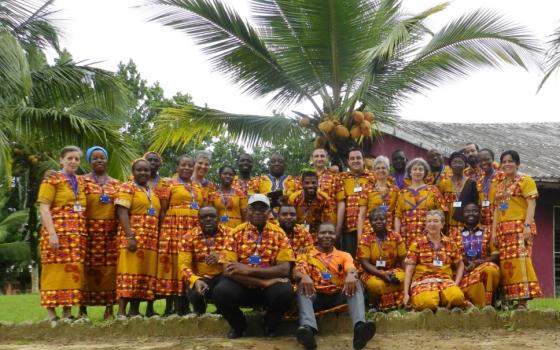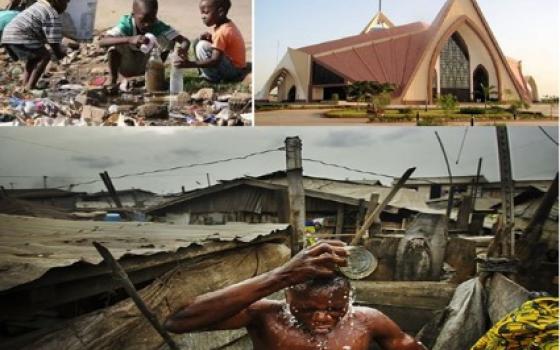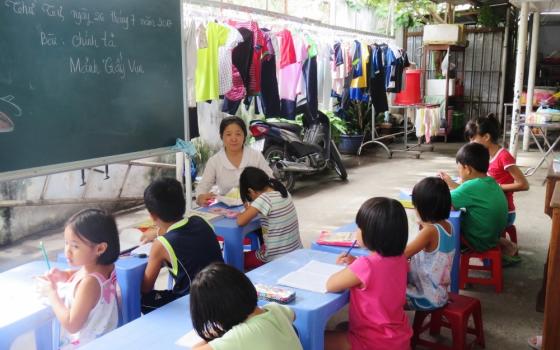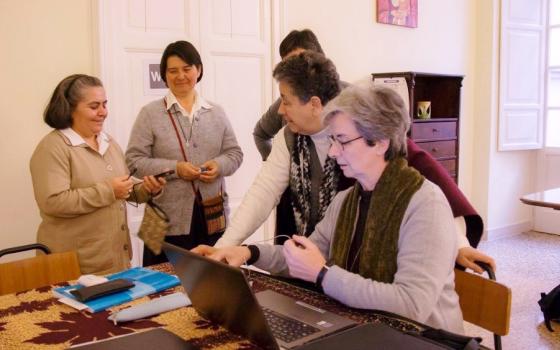Openness to cultures. Psychological shifts. Economic differences. Succession planning. Forgiveness.
This month our sister-panelists from all over the world speculate on the challenges and opportunities presented by the changing demographics of religious life, as the shift from global North to South becomes more evident. They addressed this question:
What challenges and opportunities do you see as leadership shifts from the global North to the global South?
___
Lucía Aurora Herrerías Guerra is a member of the Verbum Dei Missionary Fraternity from Mexico. After years of ministry in education and as a missionary, she now serves in Rome as president of her congregation.
 My community began in Spain in 1963. After 54 years, almost half of the members of our general government and more than half of our community members come from the South. This reality brings challenges as well as many opportunities. I believe that countries from the South can contribute a deep sense of spirituality and love for life, and values like strong family ties and a sense of solidarity. How often the poor, who know what it is to be in need, are more generous in sharing the little they have!
My community began in Spain in 1963. After 54 years, almost half of the members of our general government and more than half of our community members come from the South. This reality brings challenges as well as many opportunities. I believe that countries from the South can contribute a deep sense of spirituality and love for life, and values like strong family ties and a sense of solidarity. How often the poor, who know what it is to be in need, are more generous in sharing the little they have!
Throughout the centuries, the Catholic Church has identified herself a lot with Western Culture. When I studied the history of the church in the Philippines, I learned to admire the missionaries of those times; courageous and full of zeal to announce the Gospel, so many risked their lives traveling from Europe to Asia. Yet we know that when European missionaries came to evangelize other countries, they often rejected good local cultural values and imposed Western values as if they were an essential part of the Gospel.
Now that leadership is shifting in the church from North to South, we all have to learn that we cannot speak of cultures being "superior" to others. Every culture has something valuable because the "seeds of the Word" are in each — and every culture has to be purified by the Gospel.
I find this a challenge in my community, in the church, and in the world. People coming from the South should stop looking at the North as the "promised land" and overcome some sense of inferiority. The North should discover the values of the South and overcome some sense of superiority towards it.
I think the common effort within communities and the church in general is to discover together the "culture" of the Gospel and help each other put it into practice, giving the world a "taste" of the kingdom of God. Meanwhile as leadership shifts to the South, social injustice and terrible differences between North and South seem to increase, and exploitation of poorer countries continues.
Multicultural Christian communities and consecrated life can be a sign of justice, solidarity and true love. However, we have to be aware of the challenges this holds and take advantage of the opportunities that living together and sharing a charism with people from different backgrounds, races and cultures can bring.
Agnes Wamuyu Ngure is an Elizabethan Sister from Kenya. After ministries in education and work with refugees, she currently serves as executive secretary of the Association of Sisterhoods of Kenya (AOSK).
 Leadership shifts from the global North to South should not take anyone by storm. But we need to prepare, invest for retirement, and (as I once advised a family) start "preparing their children to be orphans."
Leadership shifts from the global North to South should not take anyone by storm. But we need to prepare, invest for retirement, and (as I once advised a family) start "preparing their children to be orphans."
Though this is hard talk, we must enable those we bring to life to survive on their own, take responsibility and grow. Succession planning must be a part of leadership, and transition requires deliberate North-to-South collaboration.
The shift from the global North to the global South is not just a geographical and cultural shift. It is also psychological. "Let go and letting be" requires growth in maturity.
There is an excellent article from Global Sisters Report about leadership shifts from the global North to South by Winnie Ojo. The title, "Charism is carrying our community through global changes," says it all. We need to reflect on and internalize our charism, this great gift that we share.
The Franciscan Sisters of St. Ann, a congregation founded in the Netherlands, is a beautiful story of Dutch sisters who recruited African vocations: Now there are over 160 sisters in Africa and about 30 Dutch sisters in Holland. What a gift! With no new vocations in Holland for 50 years, they held the general chapter in Africa and elected their first African general superior. In 2015, the generalate was moved to Nairobi, Kenya — the first international congregation with a generalate there. Holland is now a province.
There was great excitement among the sisters in Africa at having their leadership closer and more readily available, but some would like to visit the original motherhouse and "see and touch something of what our founder touched and saw." Most of us religious women have an emotional attachment to our original motherhouse. Moving the generalate out of the motherhouse is a great challenge; imagine how hard it is for the elderly sisters to let it go.
An article in Global Sisters Report about a discussion on the "diminishment in the wealthier global North and increases in the poorer global South" took me back to the early days of my congregation, the Franciscan Elizabethan Sisters. Mother Elizabeth Vendramini wrote in her diary about her struggles to provide even food and bedspreads for her sisters, but she and we know: God is always faithful to his promise.
Immaculata Chukwunyere is a member of the Congregation of the Handmaids of the Holy Child Jesus. She was a headmistress and teacher in Nigeria and Kenya before moving to the U.S. in 1999 and now teaches high school English.
 The rising leadership of the South signifies the change from a capitalist economy (that benefited only the imperialists) to neoliberal capitalism that integrates the entire planet into a market-based economic system. Embedded within this "unprecedented" shift in power from North to South is the hope that this new economic system, powered by those who experienced poverty first hand, will be more attentive to global poverty and the devastating effects of irresponsible capitalism.
The rising leadership of the South signifies the change from a capitalist economy (that benefited only the imperialists) to neoliberal capitalism that integrates the entire planet into a market-based economic system. Embedded within this "unprecedented" shift in power from North to South is the hope that this new economic system, powered by those who experienced poverty first hand, will be more attentive to global poverty and the devastating effects of irresponsible capitalism.
Consequently, a discussion of the South's global leadership becomes not only a discussion of past mistakes, but also of the opportunities for creating a better world for all people. The term "global South" therefore becomes a metaphor for the call to participatory and collaborative leadership that prioritizes open dialogue among individuals in organizations and among nations in the global community, as we work for improved human conditions and a sustainable environment.
This shift brings with it the potential of enormous opportunities for equitable global development, but also poses major challenges and dangers that — if the South does not learn from the mistakes of the North, which has engulfed our world in constant violence and struggle for survival — the degradation of humanity and our environment will continue. Alvaro Mendez, co-founder of London's School of Economics said, "With material progress comes huge responsibility for effective human and social development." The question becomes, how can the "South" maintain equitable material progress that prioritizes our global citizenship? Enmeshed in market-based capitalist economy, can the South — or all those who would benefit from global materialism — consciously avoid the exploitation of the poor and marginalized of our societies?
Evidence abounds that now "national economic development" no longer means the development of the entire nation, but only the development of groups and individuals (usually the rich and powerful) who can successfully participate in the global economy. Charged with the task of ridding the world of economic and political oligarchy, can the South effectively recalibrate and reset the materialistic tendencies that create and sustain regional and individual inequalities by putting people and our environment first?
The U.N. Development Program of 2013 called for the "emergence of global and regional frameworks that embody the principles of democracy, equity and sustainability." This call encompasses all sectors of the human society, including religious organizations.
As the dwindling North turns to the South for the improvement and sustainability of humanity, the question remains, what are the southern churches, especially women religious congregations in Africa, doing to improve human life, social development and sustainability of our environment?
Mary Nguyen Thi Phuong Lan is a Dominican Sister of Our Lady of the Rosary in Vietnam. She studied in universities in Vietnam and the Philippines and has worked in formation in Vietnam.
 As a Dominican sister for over 20 years, I think that some leaders today may face more challenges than in the past.
As a Dominican sister for over 20 years, I think that some leaders today may face more challenges than in the past.
After 1975, women religious in Vietnam did not have an opportunity for higher education, because of difficulties imposed by the communist government. Much of the country fell into poverty, Catholic schools were closed, and sisters stopped studying for degrees. But in spite of a lack of formal education, congregational leaders knew how to love and care for their sisters.
Before that time, some young women entered religious life as early as grades six to 12, before they were socially mature. They offered their lives to the Lord and zealously did the congregation's work of evangelization.
Presently, some sisters are trained for leadership in foreign countries, acquiring skills and an awareness of global issues. However, now they have to face a lack of vocations, because of social and familial cultural issues.
Bishop Nguyen Thai Hop explained "Religious choose the religious life to escape from the difficulties of material life, or to enjoy more comfortable life. A congregation seems to be a good place to study or to improve them without worrying to earn a living."
A priest said, "[Some] parents … unsuccessful in pursuing religious or priestly vocation, expect to see their ideal and image realized in their children, whom they pressure to pursue a religious life. Once they become [a] sister or priest, their family receives glory and honor and is respected by everyone. …"
Some religious today, having lost sight of the meaning and goals of the religious life, are not willing to sacrifice for the poor or the congregation's mission.
I used to do formation work, so I understand the difficulties of leaders and feel that I need to support leaders by accepting their assignments without hesitation. The example of service and leadership of sisters in the past is responsible for my vocation.
Helen Graham is a Maryknoll Sister and a native of Brooklyn, New York, who has lived in the Philippines for 50 years. At the Institute of Formation and Religious Studies in Quezon City, she teaches sacred Scripture and mentors students from across Asia, Africa and Latin America.
 In the mid-80s Mercy Sr. Margaret Farley, prominent moral theologian of Yale University, spoke at the Sister Formation Institute (now the Institute for Formation and Religious Studies IFRS) on one of her early topics, Personal Commitments. At that time I recall her referring to the Asian religious women as "a sleeping giant."
In the mid-80s Mercy Sr. Margaret Farley, prominent moral theologian of Yale University, spoke at the Sister Formation Institute (now the Institute for Formation and Religious Studies IFRS) on one of her early topics, Personal Commitments. At that time I recall her referring to the Asian religious women as "a sleeping giant."
The religious women whom I teach come from many places in Asia. Except in the Philippines and East Timor, the Christian community is a minority, surrounded by the great Asian religions such as Hinduism, Buddhism and Islam. In addition, sisters from China, Vietnam and Myanmar come from countries that have not been very warm toward Christians. In recent years, there has even been an escalation of persecution of Christians in several Asian countries. Such situations pose a challenge for women religious in Asia, in this time of a growing shift in global leadership.
It is clear that China is endeavoring to move into the vacuum created by the Trump-era withdrawal from global participation in free-trade agreements, the climate change agreement, and security alliances. China also has been expanding in the territorial waters claimed by both the Philippines and Vietnam.
I believe that one constructive way to "take the pulse" of women religious in Asia, in terms of their potential leadership role, is to follow the results of the periodic meetings of AMOR. The Asia-Oceania Meeting of Religious began in the early 1970s, sparked by an idea put forward by Maryknoll Sr. Meg Gallagher. In the early decades, AMOR was vibrant. In an interview in 1987, Good Samaritan Sr. Hiro Regina Kagayama summed up AMOR with the "five S's and five I's: solidarity, service, sharing, support and spirituality; immersion in the lives of people, involvement, investigation of the oppressive elements in society, inculturation, and inter-congregational cooperation."
The theme of the AMOR meeting in Rangoon, Myanmar this year was "Call to Ecological Conversion." Delegates discussed the environmental challenges facing their countries, how their governments and religious women and men are responding and finally focused on transformative action.
Some sisters have noted that a certain malaise seems to have crept over AMOR in recent years, but the 2013 meeting became an occasion to reinvigorate the group, and after this year's timely meeting, we hope AMOR will regain its vigor once again so that the "sleeping giant of Asia" might awaken.
María de Lourdes López Munguía is a Franciscan Missionary of Mary from Mexico who now lives in Chile. She is a psychologist and entered religious life in 2001.
 In my religious life, I have lived in three different provinces and four countries, with sisters from different nationalities, cultures, languages and background. This has been a challenge and a gift for me because the relationship with sisters who are so different has been an opportunity to learn about myself.
In my religious life, I have lived in three different provinces and four countries, with sisters from different nationalities, cultures, languages and background. This has been a challenge and a gift for me because the relationship with sisters who are so different has been an opportunity to learn about myself.
For us Franciscan Missionaries of Mary, the North-South demographic change has been rather a normal process since our congregation is international.
The transition has been slow but consistent. In Latin America, the majority of sisters who were sent there first were from Spain and France; now Latin America, Africa and Asia are sending missionaries to those countries that used to be the "sending" countries.
The little seed planted has become a strong bush — not a huge bush, but with strong roots. Even with our differences, we all live the Charism Mary of the Passion bequeathed to us: the daily offering of our lives; attaching/joining our "yes" to Mary's "yes" to God; and being witnesses of universal sisterhood.
I find challenges in the fact that we are different. We need to be patient with each other, need to listen to each other and take nothing for granted, because what is important for one of us is not for another.
Even if we are experts in communion and signs of true love, we still need to learn and be open to forgiveness each day. If we don't forgive, we can't walk as sisters; I feel this is the most powerful sign to be a disciple of Jesus, forgiveness.
But the opportunities are amazing. We, as religious communities, are the actual evidence and testimony for our world that it's possible to live without frontiers, and journey towards justice and inclusion.
Now the Institute has begun a process of transformation, and we have been having workshops for leadership; first the provincials, and now the coordinators of the communities around the world, meet in different places and share their journey.
Leadership is always a challenge, as Pepe Mujica says: "Power does not change people; it only reveals who they truly are." This is so true, and it requires us all to first live a personal journey of encounter with ourselves, and then a profound relationship with our God.
We all have dreams of religious life, but we are the only ones who can live God's dream for us.





